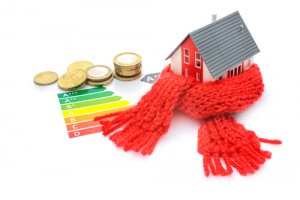
I just had my first ever home energy audit and it was AMAZING. I’m a bit of a home energy use nerd, having researched net zero homes the past year, so there’s a teeny chance you might not find chatting about LEDs, weather stripping, and attic insulation quite as fascinating as me. But hey, you just might.
A home energy audit is right for any homeowner who wants to pay less money to the gas, oil, and electricity company every month. It’ll also make your home more comfortable and less drafty.
What is an energy audit?
Simply put, an energy audit is when a trained professional searches every part of your house – from basement to attic – for ways to make your home more energy efficient. Recommendations may include plugging leaks, weather stripping doors and windows, adding insulation, upgrading appliances, switching to LEDs or CFLs, and more. Energy.gov has a nice explainer here. Or watch this quick video!
1. Free consultation.
Many states and utilities offer free energy audits, even if you do not decide to do any of the home improvements they recommend. You can conduct an energy audit yourself (Energy Star walks you through it) or search for a energy partner here. The best way to find a free energy audit is to Google “free energy audit rhode island” or whatever state you may live in. The non-profit RESNET also has ways to find a certified energy auditor. When you schedule the appointment, ask if the auditor will do a blower door test and bring an infrared reader to pinpoint low insulation areas. You can still get a good energy audit without these, however.
TIP: Watch out for auditors that charge a high price for the audit, then never show up to do the work! This is a known scam.
2. Free stuff.
Many utilities are not only underwriting the cost of the energy audit, but offering freebies to homeowners who sign up for the appointments. (Ours took 2.5 hours, some are as short as 1 hour.) We were offered as many free LEDs (they really are a better deal than CFLs) as we needed to replace incandescent light bulbs and up to three free “smart” power strips that shutoff when idle so you don’t have vampires sucking electricity when not in use.
3. Subsidized prices.
We were also offered lighting figures WITH LEDs installed for just $10 per fixture. The only requirement was that we buy at least three. I bought one for our front porch, a flood light for the back porch, and a new fixture for the landing at the top of our stairs. The fixture alone costs about $20 at Home Depot.
4. Cheap NEST.
Heard about Google’s Nest thermostat? It learns your heating and cooling habits, then automatically adjusts the temperature in your house to match. You can also turn up or down the temperature remotely using an Internet connection. You may have also heard about the Nest’s price tag…$300. Ouch! But through our energy audit, we were offered the Nest for $150 installed. Yowza!
5. Leaky areas.
The audit will give you a clear idea of where heat is leaking out of your home (or cool air if you live in a hot climate). Typically, windows and doors are culprits. But poor insulation contributes to a “leaky” home, as does a lack of air sealing around the foundation. You need to know exactly where your home is leaking in order to decide what work makes the most sense.
6. Detailed estimates.
The auditor should give you a detailed estimate of the cost of each energy improvement project. If the rep only hands you a lump sum estimate, ask them for a la carte pricing or keep looking. Unless you have a nice savings account, chances are you’ll want to select specific projects that make the most sense immediately and save other projects for later.
7. Rebates.
Energy auditors are up on what rebates and incentives you qualify for, both state and federal and any being offered by your utility. Our auditor calculated our out of pocket cost for each recommendation he made, including the 25% off we’ll get for any improvement we do, thanks to National Grid. To double check state incentives, I highly recommend DSIRE.org. Get started here.
8. Payoff timeline.
A good energy auditor will estimate the cost of a project, subtract any rebates or incentives available, and calculate how many months or years each project will take to pay off. Ours showed projects with a payoff in as little as 4 months! Others will take as long as four years to break even. How long do you plan to live in your home? On a limited budget, start with projects that have the shortest payoff. You can use the money you’re saving in energy bills to fund future projects.
9. Future plan.
Whether or not you go ahead with any of the energy recommendations, you have a blueprint for saving more money on your utility bills. Perhaps you’ll use your tax refund to pay for the improvements, or set aside $50 each month for the improvements. Keep this document handy as you may want to pass it on to the next person who owns your home.
Where can you get an energy audit?
Nationwide – The Building Performance Institute works with certified contractors to audit and make home improvements. Get started here.
National Grid customers can submit a request for a free energy audit here.
MA – Residents of Massachussetts can request a free energy audit here.
VT- Vermont residents can get started here.
RI – Rhode Island residents can start here.


Wow! I want one! I’m pretty sure our home is in decent shape, but we have questions about the insulation in the attic, as well as any other small improvements we can do. Also, we already bought a Nest and love it. That’s a great price for one! We love being able to set it to “away” if we go somewhere for a few days, then turn it back on via an app on our phones when we’re an hour away from getting home, so we don’t have to walk back into a freezing house. It also has a motion sensor in it, so it can automatically sets itself to “away” after a couple hours even if you forget. This came in handy when we went on a three week trip last winter!
@Julie I definitely recommend an energy audit, even if you suspect your home is already pretty well insulated and air tight. Especially if the audit is free! You may get some ideas about future projects you can take on to make your home need even less energy, and a good auditor will give you prices and how many months or years each improvement will take to break even.
Glad you like your Nest. We may get one in our next home. But a programmable thermostat is already saving us energy in our current home.